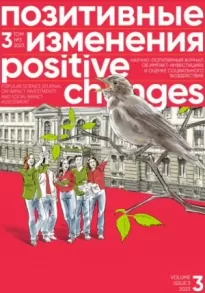Позитивные изменения. Том 3, № 3 (2023). Positive changes. Volume 3, Issue 3 (2023)

- Автор: Редакция журнала «Позитивные изменения»
- Жанр: Научная литература / Газеты и журналы
- Дата выхода: 2023
Читать книгу "Позитивные изменения. Том 3, № 3 (2023). Positive changes. Volume 3, Issue 3 (2023)"
PREREQUISITES FOR EFFECTIVE IMPLEMENTATION
In Artem Metelev’s perspective, the success of the “Service Learning” module hinges upon several factors:
1) The seamless amalgamation of theoretical education and hands-on societal involvement into a cohesive journey;
2) The cultivation and nourishment of partnerships between universities and NGOs;
3) The motivation of students to actively engage in resolving tangible social issues and challenges;
4) The formation of university-based teams comprising educators, methodologists, and proactive students, united in implementing the methodology;
5) The stimulation of regional NGOs to actively solicit their projects on the DOBRO.RF platform;
6) The expansion of students’ opportunities to partake in practice-oriented education and instilling in them a sense of solidarity towards the predicaments of others.
“Thus, after receiving knowledge in the classroom, students can leave the university grounds and venture forth to extend assistance, implement social initiatives, undergo internships, and actively contribute. In this dynamic, they effectively embody the role of both volunteers and aspirants seeking practical experience within their field of expertise.” — notes the expert.
Elena Isaeva postulates that one of the unique characteristics of implementing this technology in Russia is that not all universities have accumulated experience in collaborating with the non-profit sector. Additionally, a framework for rewarding staff members who are also members of NGOs is yet to be established. Thus, many universities will face initial challenges, necessitating them to identify suitable NGO partners, discern genuine endeavors from superficial ones, and ascertain whether it actually works. In this pursuit, reliance on regional resource centers and public chambers will be crucial, coupled with the establishment of agreements with those NGOs genuinely committed to channeling live, authentic projects for student involvement, as well as direct introduction of the service learning implementation supervisors with representatives of the regional non-profit sector.
“If service learning is being implemented for all student specializations, then the palette of NGOs involved in the learning process should be as broad as possible. That is why it is necessary to teach universities and NGOs to trust each other — to encourage a perspective that envisions universities as partners rather than mere talent incubators,” emphasizes Elena Isaeva.
This collaborative engagement between universities and the non-profit sector makes transformation inevitable, the expert says. It is paramount for both partners to recognize and embrace the benefits of it, approaching the partnership not as a mere obligation.
“If the implementation of service learning is set to continue for the long term (and we can anticipate that the technology will be piloted, refined, and eventually become commonplace), the process will undoubtedly come with its fair share of challenges. Therefore, it is crucial for the university to have a supportive partner — whether it be a public chamber or a resource center — that can explain the specifics of NGOs and guide their actions,” summarizes Elena Isaeva.
According to her, introducing service learning in freshman years is not advisable, given that students are still to acquire their professional skills. The primary objective of this technology is to bridge the gap between the acquired professional skills and real-life situations, which are presented to students for exploration under the guidance of a dedicated mentor. It is essential for the student to witness how their efforts contribute to improving people’s lives.





